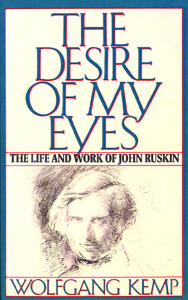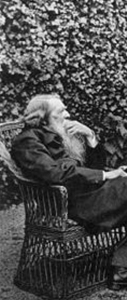John Ruskin – The seer and prophet
The man who wanted to introduce a benign Socialism in the wake of the Industrial Revolution in England
 Alas! He even as a seer and prophet, as he was worshiped even by Mahatma Gandhi didn’t foresee the rising tide of British Imperialism nor did his celebrated disciple foresee such a world of greater inequalities and inequities. Today we live in a very different world. What lessons do we learn today?
Alas! He even as a seer and prophet, as he was worshiped even by Mahatma Gandhi didn’t foresee the rising tide of British Imperialism nor did his celebrated disciple foresee such a world of greater inequalities and inequities. Today we live in a very different world. What lessons do we learn today?
Ruskin lived and worked at a time when the world was searching for adjust world. Socialism, both Utopian and Scientific, both Karl Marx and British Socialists like Ruskin, William Morris lived and worked. While Ruskin and Morris combined aesthetics and an ideal society, Karl Marx advocated violent overthrow of the existing economic and social order. The world however moved in its own way.
Violent Communism lasted for some 70 years from 1917 to 1989-90-91. In democracies, in Britain and France, even in Germany and Italy, witnessed different routes. What lessons Indians of this generation are learning? This is a time and place to reflect on some of these questions.
The life and work of John Ruskin – Publisher – Farrar, Straus and Giroux, New Yok, Pages, 500, 1990
Anyone of this generation knows John Ruskin who influenced Mahatma Gandhi, among others. Others who rated high of Ruskin were Tolstoy, Proust, the French writer and many others. Ruskin’s life almost coincided with the life and times of Queen Victoria.
There are eight chapters: One was: Graduate of Oxford (1842-1845) ,Chapter four: (The Luther of the Arts-1853-1860).Chapter Six: (The Professor-1870-1878), Chapter Seven: (The only Real Seer-1878-1890), finally Chapter eight(The Old Man of Coniston- 1889-1900).
You see, I was an early admirer and even a devotee of John Ruskin and was very much influenced by his views on arts, labour and Socialism and his Utopian projects at Oxford where he was Professor and a dreamer. He studied the Bible at home and his mother for whom he was the only child and thus she made him memorise the Bible and thus his English prose style has many Biblical allusions and there is a sort of classical tone to whatever he wrote. Of course he wrote a great deal, thirty eight volumes of collected works and thus you can see how much he must have written. Also, as a middle class man of some means he had the time and the money to travel abroad, mainly to Italy; Venice was his favourite city to illustrate his theories of art and architecture on which was a great authority. He did many wonderful things; from art he went on to politics and economy.
His thoughts on industrial revolution
It was the time of the industrial revolution, he hated the coming of the railways, and thus he was opposed to big industry which he thought spoilt the countryside and the beauty. In a way he was a successor to Rousseau, though Rousseau was too great figure, too vast an imagination was Rousseau’s and yet in his own way Ruskin came very near to the Utopian dreams.
Ruskin’s Life
You see Ruskin was born on February 8,1819 and died in the north of England ,near the Lake District at a place called Coniston Lake which I had the privilege of visiting thanks to my English hosts, the late lamented Dickenson’s, the husband wife and their children, Tim(Timothy) and Sue (Susane)were younger than me in 1959 when I was fresh to England and their home, Red How, near Cockermouth, the Wordsworth birth place town was my every day visit whenever the Dickensons went out!
Now, I am not going to tell more about Ruskin’s life. I had said it all many times and my own views on politics and society, art and literature etc. have all undergone many transformations!

You see that in the 19th century, at the end of the century, specially, the thinking men of the times were all drawn by certain basic outlook. May be, this is because of the industrial revolution and the rise of the middle classes and the emergence of the working class as a distinct feature of the society that was also becoming rich by way of higher wages or because of the emergence of inequalities, exploitation of the labour by the new capitalist class.
Also, the vulgarity of the new rich, the culture was seen as one of barbarism! Matthew Arnold reflected this phenomenon and thus in his lectures, Culture & Anarchy, he called the new rich as Barbarians, the middle classes, the Philistines, the mass, the Populace!
All he sought for was what he called the Sweetness and Light! Now, in politics and economics, there was again much confusion and uncertainty about what new form of political authority would emerge. Also the economic structure.
It was this period we see many dreamers, Utopians and many radicals, the many advocates of violence; Karl Marx was the major figure. There is a latest book on Marx and this book reveals how Marx was born not as a poor boy, he married a high class girl her title was Von and though because of his radical views he had a rough life ahead and though he went through hell all his life, his later life in London, says the new book; became comparatively comfortable, bourgeois! He enjoyed holidays to seashore and eating in the company of Engels who funded his life and did many other helps. Now, there were others too.
This is a long list and in this list comes Ruskin.
Ruskin College at Oxford
Ruskin started to establish workers’ College at Oxford. I too wanted to start one similar to Ruskin’s soon after I returned from Oxford in Coimbatore where then was a very strong trade union movement. Thus, I became friend of most of these trade union leaders, from INTUC to the AITUC and from the Right and Left Communists’ had shared the public platforms with some of the then known great Communist leaders like Parvathi Krishnan, an Oxford graduate herself, her bother Mohan Kumara Mangalam and others like K.Baladhandayutham and also K.R. Ramani and many others, of course with Socialists like K.Arumuga swamy, from Madurai, a fellow MLC in the Upper House, also Congress stalwarts at the INTUC.
Alas! They are all gone, the very structure of the society and economy changed and so too my great patrons and friends, the great textile magnets like R.Venkataswamy Naidu who established the great companies like Madras Aluminum and South India Viscose, the other great ones, G.K.Sundaram of the Swathantra Party, G.D.Naidu, the home-grown genius and innovator of many things, chiefly in the auto sector. One reason, even now the city is home for all India, why international level auto driver and auto innovations. Now, I say all these things for the benefit of the present day generation readers.
In Europe there was a great upsurge in the wake of the industrial revolution, there was crisis in agriculture, and they were pleading for “self-sufficient farming”!
Now, in Russia there were many radical utopians like Alexander Herzen, in France like Saint- Simon, Pierre Proudhon (who called private property a theft!). Why Engels wrote on private property and much on the exploitative nature of capitalism. Why, Marx predicted the death of Capitalism, right?
Rusking in today’s world
Today, Capitalism is thriving and making the world a more prosperous place, right? New technologies have changed the very face of the planet from one of poverty and wants to one of plenty. Where does Ruskin come in this new world? He is nowhere, sure as Gandhi too! There are a vast new younger people and they are all into mobile phones and social media! Where is the time for reflection and deep enquiry and also a time to search for eternal truths? Philosophy, humanities and ethics still do matter but who are the votaries of this high culture.
Now, Ruskin famously said in his classic, Unto this Last, what is economics? It is life that is wealth?
Fine words and fine sentiments. But is it really so? We need big organisations, lessons from history.
India Today
I had been traveling to Rome and Greece in search of answers from the past civilisation, from the past experiences in governance of Republics and Democracies. Also, Indians have to deliver themselves from the bondage of the British past! This has been one of my missions in life. How to give Indians their innate values, their own confidence in themselves? This is the biggest challenge. Our education can’t be an imitation of others. Our history has been totally different.
We have lived through centuries of occupations, invasions and defeats. Even in the last 70 years of freedoms, our universities are not ranked in the first 200! These are issues for us all. So, I would urge the readers to read this great and a rare book. All through my Oxford years I looked upon Ruskin as demigod. Not anymore. He never for once talked of his country’s occupation of other colonies. He never once seems to have imagined that his country might not survive the tag of great Britain! What a funny field history is!
There is much to ponder over when we read about Ruskin; the great German Nobel Literature Laureate Thomas Mann said of Ruskin, he was a great Romanticist of the Victorian era. May be, that is right. For every ear needs such Romantics and dreamers. Certain idealism gives every age certain glow and hope and faith in its future.